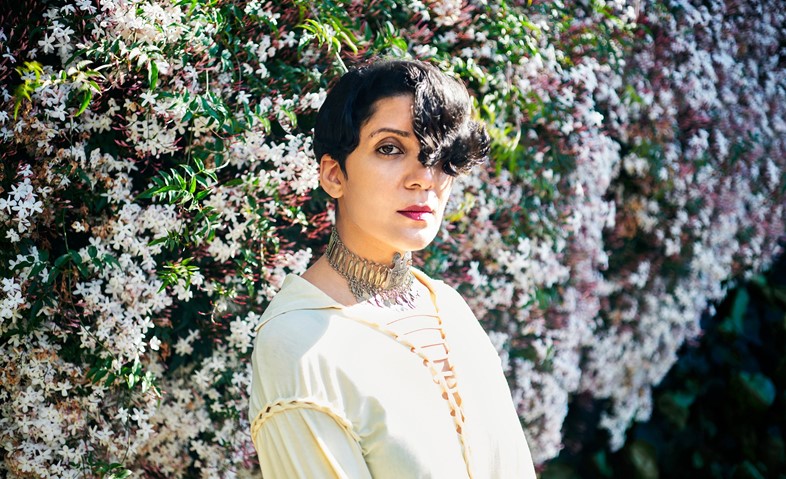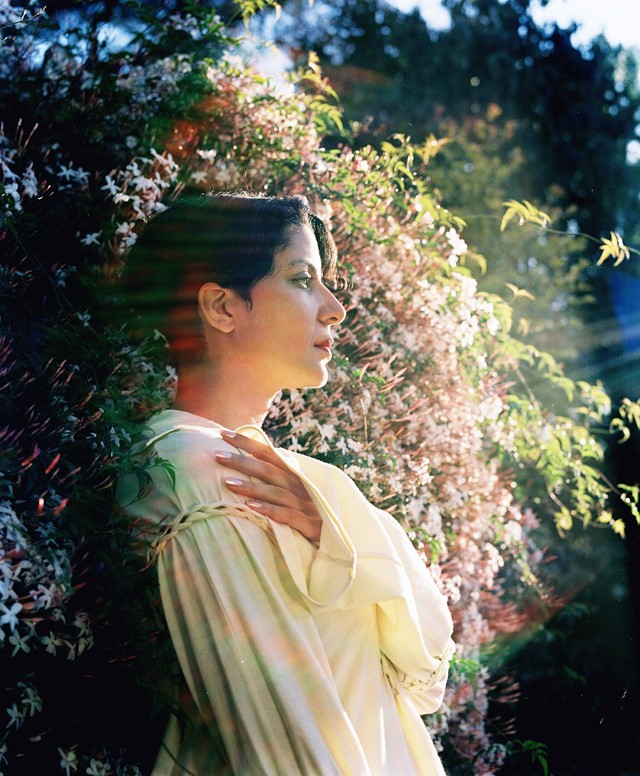As her new album Medieval Femme is released, the producer reveals why she felt destined to write this record at this moment and the mood of melancholic longing which underpins the tracks
Fatima Al Qadiri moved to LA ten days before the pandemic shut it down. “The future just seemed so volatile,” she tells me over Zoom. “I really couldn’t deal with being in LA. I was at a loss”.
Stuck in her apartment, the Kuwait-raised producer decided to harness her energy into writing music. Inspired by the classical poems of Arab women from the Jahiliyyah period to the 13th century, she borrowed from her own feelings of sadness and longing to imagine a sonic world at the border between depression and desire. “Depression is desire overwhelming the body and making you stop in your tracks,” she agrees. “You want so much that you can’t function any more.”
The result, Medieval Femme, is a record that uses the metaphor of an Islamic garden to build otherworldly tracks that sit on the precipice between light and darkness, past and future. “Medieval Femme is a mood ultimately,” she explains. “It’s a mood that descends on you, like a melancholic longing, which I associate with poetry of Arab women in medieval times.”
For those familiar with the artist’s work, the propensity towards building elaborate conceptual frameworks, which propel you into strange and uncanny worlds, will come as no surprise. Her 2014 debut Asiatisch imagined China through a western filter, while her 2012 Desert Strike EP explored the idea of war as seen through the sinewy lens of a video game. On 2016’s Brute, she celebrated the right to protest in a time of shadowy political corruption, while her subversive 2017 EP Shaneera used a heady mix of Grindr chats and online drag comedy skits to examine regional queerness in the Arabian Peninsula.
With Medieval Femme, Al Qadiri wanted to draw on the idea of melancholy, as a place of reverie and desolation. Channeling Heidegger’s idea of existential death, where the individual, preoccupied by the weight of past and future, is unable to exist in the present, she blurs the line between these seemingly opposite states, transporting the listener into a state of celestial sorrow. “There is only the past and future when you’re depressed, because you’re lost in the present,” she explains, “I wanted the music to communicate this.”

The album takes instrumentation emblematic of the past and recasts it in a futuristic setting to evoke the feeling of being neither here nor there. Soft-synth lutes, organs and pipes are filtered through a synthetic lens and reverberate against one another. Al Qadiri’s vocals of repetitive, mantra-like phrases are pitched and distorted, rich and honeyed. Malak, the record’s single, weaves a moody soundscape of intricate oud (Arabic lute) picking and droning synths, as Al Qadiri sings in Arabic, “Oh angel of the prophets/ Take me with you/ To the gate of wing/ to the garden of kings/ in a sea of roses.” She explains, “It’s someone asking an angel to take them away from their pain to fantastical, non-existent places. To take them to these places that don’t exist, which will obviously never happen, and that’s the ultimate sadness.”
“I wanted longing to be interspersed with moments of light and moments of darkness,” she adds. “Like, there is a pretty heavy distortion in certain areas of the record, which is reality creeping back, and the pain creeping back in, and overwhelming the person who wants to get out of this state.”
On Tasakuba (Spilling), Al Qadiri’s voice takes center stage against a hazy, minimalist soundscape, while Kaltham Jassim recites a verse from the 7th-century poet Al-Khansa: “Oh my eye/ Why do you not weep/ Like a waterfall/ At these desolating times.” “In west Asian culture, melancholy is the highest form of art, and has been the case since the dawn of our civilisations and our cultures,” she says. “A majority of Arab music is about unrequited love.”
Al Qadiri traces her preoccupation with longing back to a traumatic incident she had as a child. “I was 11 years old and didn’t know how to process it,” she explains. “My reaction to it was that I can’t move, I can’t leave my bed, I nearly got expelled from school several times.” Daydreaming became a way to process these complex emotions – “I did some really major daydreaming and inserting myself into all sorts of elaborate medieval fantasies as a way of dealing with it.”
She maintains that daydreaming is essential, especially for young people, as a way of blocking out some kind of painful reality. This is particularly true in our current state of global longing. “I am a firm believer in destiny and it felt like I was destined to write this record at this moment,” she explains. Although Al Qadiri began work on the record before the pandemic, the pervading sense of dislocation that carries Medevil Femme mirrors our own feelings of melancholy for what was and what will be. Like Al Qadiri’s archetype, we can transport ourselves to fantasy worlds to make sense of the present. She elaborates, “I think that is what depression is: a way to pause and reflect on the why and how.”
Medieval Femme is out now.
